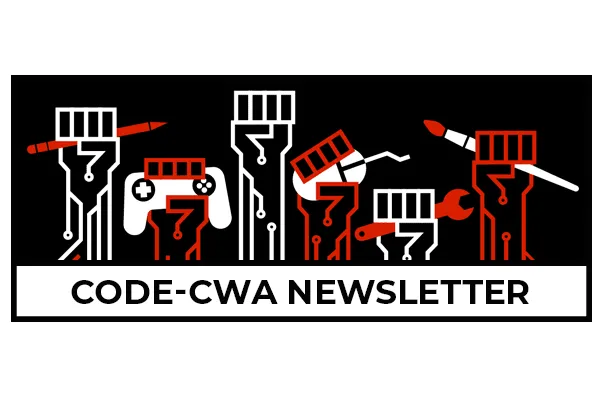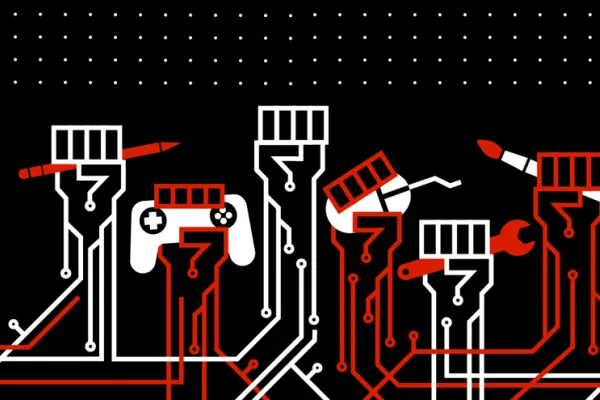June 12 Newsletter

Greetings!
Tech companies are speaking out en mass to exhibit their support for the movement for Black lives. This incredibly hypocritical position is hard to fathom. When Amazon's chief propagandist showed up at a Black Lives Matter event in DC over the weekend he was rightly lampooned for the double standards. Not only does Amazon have millions in contracts with police departments, both to host their data and to help them do video surveillance on communities of color via Ring doorbell police partnerships with over 1,300 police forces, but the company very publicly fired a prominent Black organizer, Chris Smalls, who was trying to protect his co-workers from COVID-19. Not only did they fire Chris they also discussed a racist plan to malign him with the media.
We've seen how tech companies spend billions of dollars on marketing budgets to espouse thoughtful identities to win over liberal consumers, but we can't deny what's right in front of us: They gladly take billions in surveillance contracts that are ultimately weaponized against Black communities on the same day they tweet how much Black Lives matter to them.
For any worker who is angry about this blatant duplicity, we're here to chat. Get in touch, and let's organize so that we use our collective power to definitively stop these companies from using our labor to help further terrorize communities of color.
Events
CWA Legislative-Political Conference: The CWA Legislative-Political conference is taking place this week. On Wednesday evening a number of CWA activists joined a panel titled: "Building Power to Dismantle Racism". The final session is on today and it's about our response to the crisis in terms of expanding paid leave, unemployment benefits, and workers' rights. See the week's full agenda here.
CODE-CWA is regularly hosting free, virtual training sessions on how to organize! Registration information can be found here.
Worker News
250+ Microsoft Workers Demand the Company cancel Police Contracts: In a strongly worded letter a group of Microsoft workers called on the CEO and an executive vice president to cancel contracts the company have with Seattle Police, and much more. This builds on the work workers at Microsoft started two years ago when they called on the company to cancel the contracts the company has with ICE. More at Onezero.
IBM, Amazon & Microsoft make vague commitments not to sell facial recognition to police until after they've written the laws: IBM's decision not to offer general purpose facial recognition was welcomed in some quarters but we remain skeptical. They don't say they won't offer custom facial recognition software, they only commit to not offering this to domestic law enforcement (what about agencies at the border such as CBP), and they continue to involve themselves in lobbying Congress to shape how law enforcement uses technology. We need more worker voices and folks who will be directly impacted at the table, less management, when it comes to shaping how surveillance technology will be deployed, given we know that it'll be used largely communities of color. More at The Verge. Amazon followed IBM shortly afterwards. They announced they won't sell facial recognition to police for a year. They haven't said whether they'll cancel the 1,300+ partnerships their doorbell camera company, Ring, has with police, nor whether they'll stop providing this technology to ICE. There's a move in DC to put federal legislation in place. We know companies like IBM and Amazon have more lobbyists than workers do, be on the lookout for rules that are written in favorable terms for the companies. When you see them, reject them.And yesterday Microsoft joined the club. It's clear from their statement they're also holding off until they've written the rule to suit themselves in DC. More on Washington Post.
Longshore workers went on strike to honor George Floyd & other victims of police brutality: On Tuesday longshore workers organizing with a number of chapters within the International Longshore and Warehouse Workers Union (ILWU) comprising over 60,000 members withheld their labor on both the East and Coast. The action were timed to coincide with George Floyd's funeral. More on Jacobin.
How racist policing took over American cities: This interview with historian Khalil Muhammed helps us understand how we ended up with police forces that seem hellbent on brutality. Reading and understanding this history tells us it wasn't a straight line, that the future is not yet written, and there are decisions we make make today that will change the way we keep each other protected in the future. More on Vox.
It's time to make content moderators full time employees: As you well know across Big Tech the companies have developed similar employment models. These models create a two tiered caste system dividing the haves and the have-nots. On the one side the full timers get shares, health insurance, big salaries, and bonuses. On the other side the contractors or vendors don't typically get health insurance, sometimes are not allowed on company buses, and are usually paid lower rates by the hour. No 401ks, no shares, none of the perks. A new report from Center for Business & Human Rights out of NYU makes the case that this needs to change, that Facebook in particular needs to hire their content moderators on to staff. More on Bloomberg.
Jane McAlevey's Vision for the Future of American Labor: This is a book review about Jane McAlevey's relatively new book that makes the case for unions. The books chronicles some recent hard fought wins by nurses and teachers and argues that systemic grassroots organizing is essential for worker organizing, and ultimately the way we repair today's ravaged democracy. If you haven't read this book yet, we highly recommend it. More in the New Yorker.
Organizer Tip of the Month
You might be surprised if you start conversations with your co workers when you find out what people in similar positions get paid. This week, reporters are speaking publicly about wages and salaries in the media industry. In the tech industry workers have in companies created spreadsheets to share what different jobs get paid what. This level of transparency is a helpful way to know what the HR and the bosses are telling other people. If workers in your company haven't yet shared salaries across different teams, start a spreadsheet and send it around. It often only takes a few people to stand up before others gain confidence and take an action not for themselves, but for the collective good.
Labor History
In 1972, more than 1,200 black union officials and rank and file members, representing thirty-seven different international and national unions, met in Chicago for two days to discuss the role of black trade unionists in the labor movement. Five black labor leaders, alarmed that the AFL-CIO Executive Council had taken a "neutral" position in the 1972 presidential election between incumbent Richard Nixon and challenger George McGovern, called this founding conference of the Coalition of Black Trade Unionists. They believed AFL-CIO President George Meany had ignored the voice of black trade unionists. Neutrality, they believed, would contribute to the re-election of Nixon.
Turnout at the initial meeting, at the La Salle Hotel, constituted the largest single gathering of Black unionists in the history of the American labor movement. It was a bold, empowering action. While the impetus for the Chicago conference was the presidential campaign, the most significant development was the establishment of a permanent organization the Coalition of Black Trade Unionists. The delegates made it clear that black workers were ready to share in the power of the labor movement at every level of its policy-making process. CBTU would be a progressive forum for black workers to bring their special issues within unions as well as act as a bridge between organized labor and the black community.
Today, the Coalition of Black Trade Unionists advocates for the 2.7 million organized black workers in the U.S. and Canada. CBTU has more than 50 chapters.
If you are interested to learn more, this book: "Workers On Arrival: Black Labor in the Making of America" has written about CBTU's formation and other important parts of Black labor history in the United States.
Workers at a metallurgical factory, 1919. (Alamy / Marka)
Song of the Week
GUNS OF BRIXTON - JIMMY CLIFF
How you gonna come?
With your hands on your head
Or on the trigger of your gun?
How you gonna go?
Shot down on the pavement
Or waiting in death row
You can bruise us
But you'd have to answer to
Oh, the guns of Brixton
CODE-CWA Newsletter: February 21, 2025

